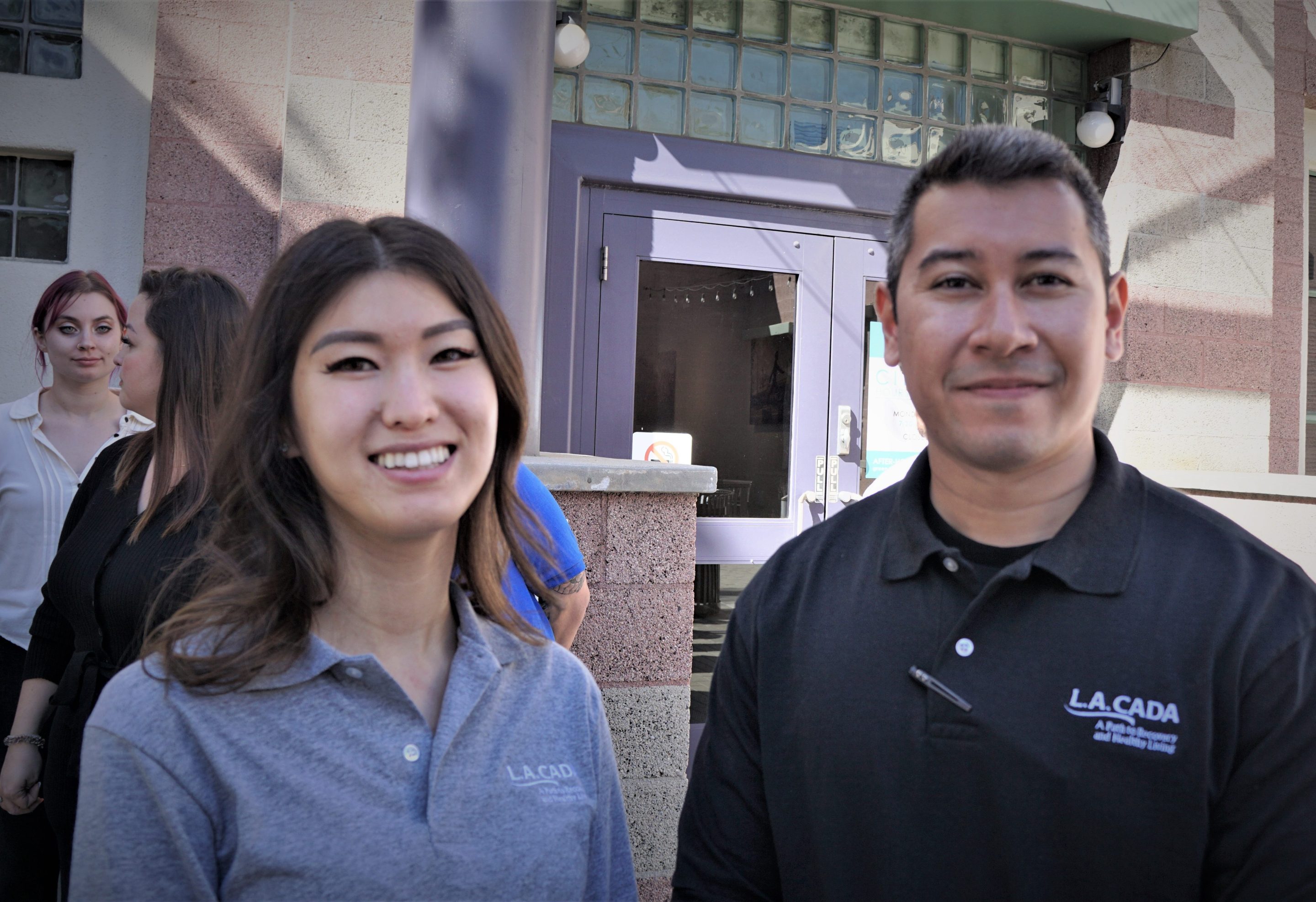On Wednesday, the San Gabriel Valley Council of Governments held its official launch for SGV CARE – Crisis Assistance Response & Engagement. Two member mobile mental health crisis teams will respond to calls for assistance in Arcadia, San Marino, South Pasadena, and Montebello.
The teams are staffed by licensed clinicians and certified peer support specialists from Los Angeles Centers for Alcohol & Drug Abuse (L.A. CADA – the same organization that has provided housing outreach services in the city of Alhambra).
During the SGV CARE pilot, professionals are on call 40 hours a week in Arcadia, San Marino, and South Pasadena (M, W, Th, F 8 a.m.-6 p.m.), and 20 hours a week in Montebello (M & W 8 a.m.-6 p.m.). They accompany police officers or firefighters in their own “alternative crisis vans.”
The program has been active since the summer. SBLA spoke to two team members, Jackalyn Jung and Jordan Guitron about what a day is like on the job.
“I would say kind of like how EMTs are always on standby and they're ready to go when they get an emergency call… That's the same thing for us when we get an emergency call that pertains to mental health. We're ready and we get to wherever the call is within 10 minutes,” says Jung.
Guitron himself is an EMT with five years experience, including a FEMA deployment to New York City at the onset of the Covid-19 pandemic. Jung is an associate clinical social worker on her way to becoming a licensed clinical social worker. Together they serve Arcadia, San Marino, and South Pasadena, while a different team takes Montebello.
What kind of crises do they respond to? “A lot of times that may look - but not all the time - like someone withdrawing from any drug, or coming down from it, or they're generally just experiencing suicidal thoughts, homicidal thoughts and ideation.” says Jung.
Guitron adds, “It can even go as far as a person becoming gravely disabled so that's why you have the clinician here available to write a 5150 hold [72 hour involuntary psychiatric hospitalization] or 5585 [for minors] depending on the age of the client.” Guitron says someone who is “gravely disabled” is “somebody who's not able to take care of themselves such as eating, bathing, cleaning themselves.”
The calls all come to SGV CARE from 911 calls referred by their partner agencies (local police and fire departments). So far, Jung says, “I think the calls that we have responded to were great; they're exactly what this program was implemented for. They were clients struggling with mental health crisis issues and we were there to de-escalate the situation, assess where their head was at in the moment, see if they need further mental health evaluation [...] They [the police] would transfer the clients to the hospital. We will follow right behind them, but since we are the ones writing the hold, we will be with the client making sure they are safe. Once they are released from the hospital. We make sure that they are linked with services for ongoing care.”
Jung adds, “We want to make this a 24 hour service because people can be in crisis at any time of the day or at night. So eventually, hopefully, we'll get there. But for now, it's been working out.”
SGVCOG President and Monrovia Mayor Becky Shevlin says that’s the goal. Shevlin also noted that the mobile crisis response program will receive twelve months of pro-bono technical assistance from the Harvard Kennedy School of Government Performance Lab.
Funding for the pilot comes from Measure H, and at the time of the press conference, California State Senator Anthony Portantino (SD-25) contributed an oversized check for $850,000 from the state’s 2022-2023 budget.
“This program is gonna save somebody’s life,” said Portantino. “When 44 percent of our teenagers are feeling sad, we have to do something about it. When the homeless crisis is raging, we have to do something about it. When the opioid crisis is raging, we have to do something about it… And this is local government saying ‘we’re gonna take those reins, and we’re gonna do something.’”
SBLA San Gabriel Valley coverage, including this article and SGV Connect, is supported by Foothill Transit, offering car-free travel throughout the San Gabriel Valley with connections to the new Gold Line Stations across the Foothills and Commuter Express lines traveling into the heart of downtown L.A. To plan your trip, visit Foothill Transit. “Foothill Transit. Going Good Places.”
Sign-up for our SGV Connect Newsletter, coming to your inbox on Fridays.





